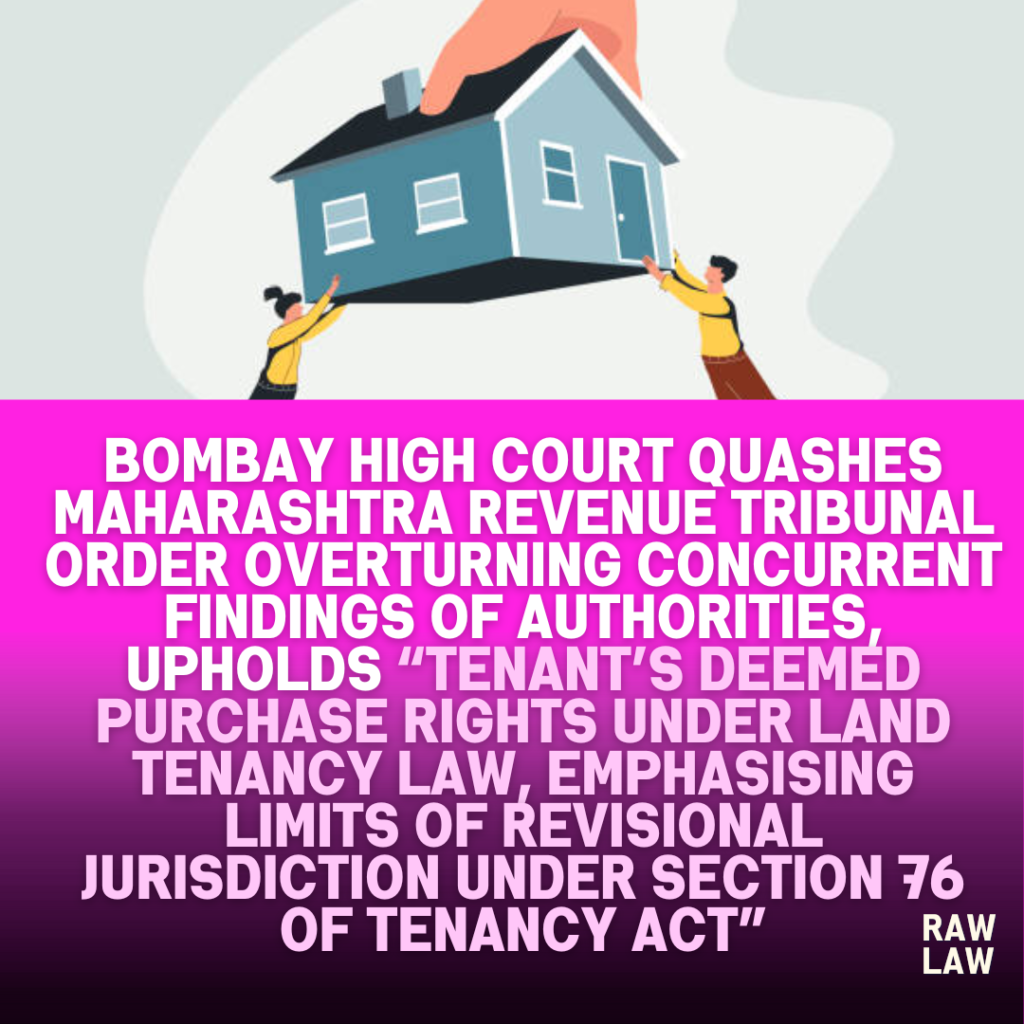“Revisional authorities under Section 76 cannot re-appreciate evidence or act as appellate bodies, particularly when concurrent factual findings exist.”
Court’s Decision
The Bombay High Court allowed the writ petition, quashing the Maharashtra Revenue Tribunal (MRT) order dated 01.01.1998 which had reversed two concurrent orders passed by the Additional Tahsildar & A.L.T., Panhala (dated 10.07.1990) and Assistant Collector, Shahuwadi Division (dated 25.01.1991), and restored these original orders.
The High Court held that:
- The tenant-petitioner is deemed to have purchased the 5/8th share of the disputed land under Section 32G.
- The MRT exceeded its jurisdiction under Section 76 of the Tenancy Act by re-appreciating facts.
- The private respondents are at liberty to pursue civil remedies.
Facts
The case involved agricultural land in Panhala, originally tenanted by the petitioner’s adoptive father. The landlord’s predecessor applied for an exemption under Section 88C, which was partially granted for 3/8th of the land, with the remaining 5/8th reverting to the tenant. Subsequent proceedings under Section 32G declared the petitioner as the deemed purchaser for the 5/8th share. The MRT reversed these findings on the landlord’s revision, leading to the present writ.
Issues
- Whether the MRT could re-appreciate evidence and overturn concurrent factual findings under Section 76 of the Maharashtra Tenancy and Agricultural Lands Act.
- Whether the petitioner’s status as deemed purchaser of 5/8th share was legally valid.
- Whether procedural limitations on the MRT were violated.
Petitioner’s Arguments
- The partial exemption under Section 88C became final and the tenant was entitled to purchase the remaining 5/8th share under Section 32G.
- The MRT lacked jurisdiction under Section 76 to re-examine factual findings of lower authorities.
- Civil proceedings upholding adoption validated the petitioner’s status as the legal heir of the tenant.
- Cited Maruti Jaywant Shinde v. Shantabai Baburao Gotharne (2021) to emphasise that revisional jurisdiction is limited to errors of law or procedure, not re-evaluation of facts.
Respondent’s Arguments
- The petitioner’s adoption was denied by the tenant’s widow, questioning his locus.
- The petitioner was not a party to related civil proceedings where the respondent was declared the exclusive owner.
- The respondent had possession since 1979, and revenue records reflected the respondent’s ownership.
- The MRT’s order was justified based on these factual disputes.
Analysis of the Law
- Section 76 of the Tenancy Act restricts the MRT’s jurisdiction to examining legality, material issues of law, or procedural defects.
- The revisional authority cannot re-evaluate evidence or override concurrent factual findings unless perverse.
- Orders under Sections 88C and 32G must be read harmoniously, preserving the statutory rights of the tenant.
- Reliance was placed on Hindustan Petroleum v. Dilbahar Singh, Rahimatulla Rahiman Sarguru v. Bapu Hari Mane, and Maruti Jaywant Shinde to delineate revisional limits.
Precedent Analysis
- Maruti Jaywant Shinde v. Shantabai Baburao Gotharne (2021): Held revisional jurisdiction is limited to jurisdictional errors, errors of law, or procedural irregularities.
- Hindustan Petroleum Corporation v. Dilbahar Singh: Distinguished between revisional and appellate jurisdiction.
- Rahimatulla Rahiman Sarguru v. Bapu Hari Mane: Clarified MRT powers akin to pre-1976 second appeals under CPC, limited to legal issues.
These cases were applied to emphasise that the MRT had no jurisdiction to reverse findings of fact when supported by evidence.
Court’s Reasoning
- The MRT exceeded its powers under Section 76 by re-appreciating evidence and reversing concurrent factual findings regarding tenancy, possession, and deemed purchase.
- The exemption certificate under Section 88C for 3/8th share meant the tenant’s rights for the remaining 5/8th under Section 32G were intact.
- The MRT’s order, being contrary to settled law on revisional limits, was unsustainable.
- The petitioner’s adoption was upheld in earlier civil proceedings, further supporting his locus.
Conclusion
The MRT’s order dated 01.01.1998 was quashed. The orders of the Additional Tahsildar dated 10.07.1990 and the Assistant Collector dated 25.01.1991 were restored, affirming:
- The petitioner’s status as the deemed purchaser of 5/8th share of the land.
- The respondents’ right to pursue any further claims in the appropriate civil forum remains open.
The writ petition was allowed and disposed of.
Implications
- Reinforces limitations on MRT’s revisional jurisdiction under Section 76 to legal and procedural errors only.
- Affirms tenant rights under Section 32G when partial exemption under Section 88C is granted to landlords.
- Protects stability of concurrent factual findings by lower authorities, preventing re-litigation of settled facts.
Cases Referred and Their Relevance
- Maruti Jaywant Shinde v. Shantabai Baburao Gotharne (2021): Cited for the limitation on revisional jurisdiction, establishing MRT cannot re-appreciate facts.
- Hindustan Petroleum Corporation v. Dilbahar Singh: Clarified the conceptual difference between appellate and revisional jurisdiction.
- Rahimatulla Rahiman Sarguru v. Bapu Hari Mane: Supported that MRT’s revisional powers are limited to jurisdictional issues, akin to pre-amendment Section 100 CPC.
These cases strengthened the High Court’s reasoning to restore the lower authority’s orders.
FAQs
1. Can the Maharashtra Revenue Tribunal re-appreciate evidence while exercising revisional jurisdiction under Section 76 of the Tenancy Act?
No. It can only intervene on questions of law, procedural irregularity, or jurisdictional error.
2. Does an exemption under Section 88C affect the tenant’s right to purchase the remaining land?
Yes, the tenant remains entitled to purchase the unexempted portion under Section 32G.
3. What happens if concurrent factual findings are reversed by the revisional authority?
Such reversal is beyond jurisdiction unless findings are perverse or legally flawed, making them liable to be quashed.
